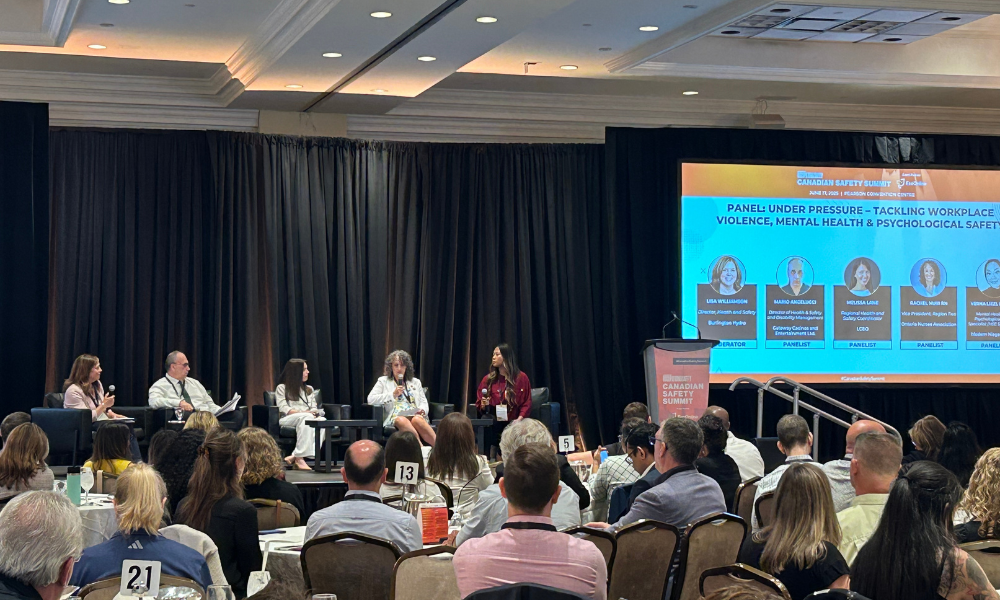Speaking at the Conference Board of Canada's annual Health and Safety Forum, Ontario labour minister Charles Sousa expressed his enthusiasm for the recommendations put forth by the Dean Report, and spoke of his pride at seeing the ministry's progress with implementing changes.
The health and safety community should expect to see significant changes to the province's occupational health and safety system as the Ministry of Labour pushes through with implementation of the recommendations of the Dean Panel report, according to Ontario Minister of Labour Charles Sousa.
While speaking at the Conference Board of Canada's annual Health and Safety Forum, Sousa outlined some of the changes currently taking place at the Ministry of Labour in connection with improving the province's health and safety enforcement and regulation. The event, "Building an Enterprise-Wide Safety Culture," took place at the Sheraton Centre in Toronto on March 23.
Sousa stated that the nearly four months since the Dean Panel report was published have seen the ministry work towards the goal of implementing changes that will bring the recommendations into greater focus. Their early efforts culminated in a series of proposed amendments to the Occupational Health and Safety Act‚ and Workplace Safety and Insurance Act‚ that will see sweeping changes made to the scope and structure of the ministry's OHS responsibilities.
According to Sousa, the amendments will provide the ministry with three important tools for promoting increased workplace safety in the province. The first of these tools will see the Ministry of Labour established as the lead for accident prevention, transferring the responsibility from the Workplace Safety and Insurance Board (WSIB), which currently handles such functions. The second will see the appointment of a chief prevention officer, who will be responsible for coordinating and aligning the prevention system, as well as overseeing all safety and prevention-related activities. The third major change contained in the amendments will see the establishment of a new prevention council‚ with representatives from labour, employers and safety experts‚ to advise the chief prevention officer and the minister.
Much has changed since the recommendations made by the Dean Report were first made public on December 16, 2010. As Sousa pointed out, he himself is a great example of that: he was sworn in as minister on that same day, and was tasked with managing expectations and orchestrating the ministry's response to the recommendations.
Headed by Tony Dean, the expert panel was appointed in early 2010 and included representatives from labour, employers and academia with workplace health and safety expertise. During the course of its review, the panel received more than 400 responses in over 50 meetings with stakeholders across the province, and presented its finding in a report in December of 2010.
It wasn't an easy spot to be put in, but Sousa said his job was made easier by the fact that all of the recommendations brought forth by Tony Dean and his panel of experts would make for safer workplace environments in the long run. In the end, the Ministry of Labour accepted all of the report's 46 recommendations.
In addition to the major systemic changes, the amendments would also give the minister of labour oversight of the province's health and safety associations, as well as the education, training and promotion of workplace health and safety.
Sousa noted that an interim prevention council has been established to help facilitate the implementation of the recommendations and establish new protocols in accordance with them.
Almost a month removed from the announcement of the proposed amendments, Sousa called the changes‚ as well as the Dean Report more generally‚ "a game changer," saying the changes being implemented will ultimately change the face of workplace safety in Ontario for the better. He pointed specifically to the free mandatory training that will be provided for supervisors, new workers and high-hazard workers‚ as well as the increased speed with which the ministry will be able to handle complaints and claims‚ as benefits of the changes going forward.
The event also featured a number of other sessions, including a panel discussion on what employers can expect from the Dean Report that featured Vernon Edwards, of the Ontario Labour Federation; John Macnamara, of Hydro One Inc.; John Vander Dolen, of the Ministry of Labour; and Sue Birch, of the WSIB. Another panel session focusing on taking a leadership role as a health and safety professional included Michael Burke of the Infrastructure Health & Safety Association; Julian Hogetarp, of K-Line Maintenance and Construction Ltd.; Emma Pavlov, of the University Health Network; and Allan Smofsky, a workplace health strategist.
Other speakers included Elizabeth Mills, of Workplace Safety & Prevention Services, with a presentation on building a safety culture through positive reinforcement; Sarah E. Wheelan, of Threads of Life, speaking about her experience as the sister of someone severely injured in a workplace accident; Judy Colombi, of Loblaw Companies Limited, discussing her organization's five year plan to improve health and safety performance; Nicole S. Thunich, of PepsiCo Canada, discussing the importance of a commmitted CEO when it comes to improving health and safety; William Davies, Paul DeDonato and Noel C. McDermott, of The Home Depot of Canada Inc, with a case study of Home Depot's safety practices and why they're effective; and Claudio Girolami and John G. Krampp, of Robinson Solutions and the Syncreon Corporation, respectively, with a ten step solution to changing safety culture and improving performance.
The health and safety community should expect to see significant changes to the province's occupational health and safety system as the Ministry of Labour pushes through with implementation of the recommendations of the Dean Panel report, according to Ontario Minister of Labour Charles Sousa.
While speaking at the Conference Board of Canada's annual Health and Safety Forum, Sousa outlined some of the changes currently taking place at the Ministry of Labour in connection with improving the province's health and safety enforcement and regulation. The event, "Building an Enterprise-Wide Safety Culture," took place at the Sheraton Centre in Toronto on March 23.
Sousa stated that the nearly four months since the Dean Panel report was published have seen the ministry work towards the goal of implementing changes that will bring the recommendations into greater focus. Their early efforts culminated in a series of proposed amendments to the Occupational Health and Safety Act‚ and Workplace Safety and Insurance Act‚ that will see sweeping changes made to the scope and structure of the ministry's OHS responsibilities.
According to Sousa, the amendments will provide the ministry with three important tools for promoting increased workplace safety in the province. The first of these tools will see the Ministry of Labour established as the lead for accident prevention, transferring the responsibility from the Workplace Safety and Insurance Board (WSIB), which currently handles such functions. The second will see the appointment of a chief prevention officer, who will be responsible for coordinating and aligning the prevention system, as well as overseeing all safety and prevention-related activities. The third major change contained in the amendments will see the establishment of a new prevention council‚ with representatives from labour, employers and safety experts‚ to advise the chief prevention officer and the minister.
Much has changed since the recommendations made by the Dean Report were first made public on December 16, 2010. As Sousa pointed out, he himself is a great example of that: he was sworn in as minister on that same day, and was tasked with managing expectations and orchestrating the ministry's response to the recommendations.
Headed by Tony Dean, the expert panel was appointed in early 2010 and included representatives from labour, employers and academia with workplace health and safety expertise. During the course of its review, the panel received more than 400 responses in over 50 meetings with stakeholders across the province, and presented its finding in a report in December of 2010.
It wasn't an easy spot to be put in, but Sousa said his job was made easier by the fact that all of the recommendations brought forth by Tony Dean and his panel of experts would make for safer workplace environments in the long run. In the end, the Ministry of Labour accepted all of the report's 46 recommendations.
In addition to the major systemic changes, the amendments would also give the minister of labour oversight of the province's health and safety associations, as well as the education, training and promotion of workplace health and safety.
Sousa noted that an interim prevention council has been established to help facilitate the implementation of the recommendations and establish new protocols in accordance with them.
Almost a month removed from the announcement of the proposed amendments, Sousa called the changes‚ as well as the Dean Report more generally‚ "a game changer," saying the changes being implemented will ultimately change the face of workplace safety in Ontario for the better. He pointed specifically to the free mandatory training that will be provided for supervisors, new workers and high-hazard workers‚ as well as the increased speed with which the ministry will be able to handle complaints and claims‚ as benefits of the changes going forward.
The event also featured a number of other sessions, including a panel discussion on what employers can expect from the Dean Report that featured Vernon Edwards, of the Ontario Labour Federation; John Macnamara, of Hydro One Inc.; John Vander Dolen, of the Ministry of Labour; and Sue Birch, of the WSIB. Another panel session focusing on taking a leadership role as a health and safety professional included Michael Burke of the Infrastructure Health & Safety Association; Julian Hogetarp, of K-Line Maintenance and Construction Ltd.; Emma Pavlov, of the University Health Network; and Allan Smofsky, a workplace health strategist.
Other speakers included Elizabeth Mills, of Workplace Safety & Prevention Services, with a presentation on building a safety culture through positive reinforcement; Sarah E. Wheelan, of Threads of Life, speaking about her experience as the sister of someone severely injured in a workplace accident; Judy Colombi, of Loblaw Companies Limited, discussing her organization's five year plan to improve health and safety performance; Nicole S. Thunich, of PepsiCo Canada, discussing the importance of a commmitted CEO when it comes to improving health and safety; William Davies, Paul DeDonato and Noel C. McDermott, of The Home Depot of Canada Inc, with a case study of Home Depot's safety practices and why they're effective; and Claudio Girolami and John G. Krampp, of Robinson Solutions and the Syncreon Corporation, respectively, with a ten step solution to changing safety culture and improving performance.





